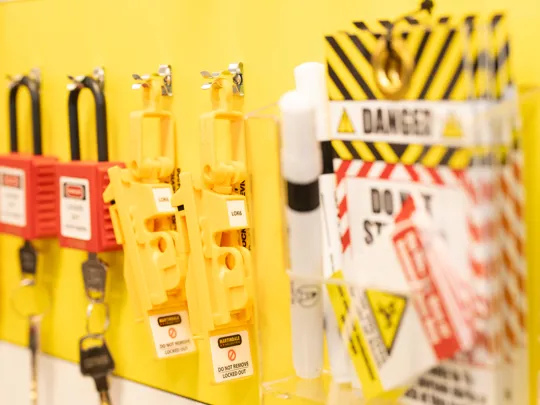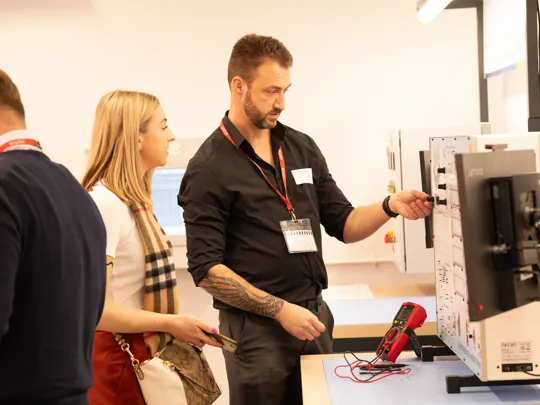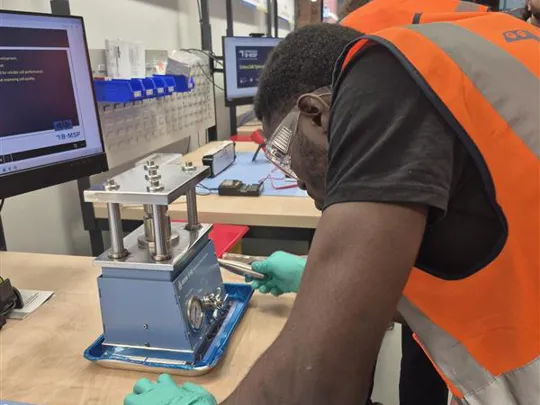Why choose a Foundation in High Voltage Battery Assembly Objective programme?
- ADVANCED AND IMMERSIVE LEARNING – B-MSP offers industry-aligned, hands-on training using real-world simulations, digital tools and practical practice. Blending classroom, VR/AR, and physical learning ensures strong understanding and lasting skills.
- CERTIFIED AND INDUSTRY-POWERED – Accredited by City & Guilds and shaped with leaders like Microsoft, Jaguar Land Rover and Rockwell Automation, B-MSP provides trusted, transferable skills aligned with real production needs.
- WORKFORCE READY – B-MSP produces job-ready graduates with practical, workplace-based skills in battery manufacturing. Learners gain confidence and experience from day one, while employers get a skilled, productive workforce.
- FLEXIBLE AND SCALABLE – Adaptable for both small teams and large companies, B-MSP integrates into in-house training. A structured core plus custom modules give employers scalable, tailored workforce solutions.
Our facilities
Students will develop their skills in our brand-new Battery-Manufacturing Skills Pathway Learning facility within the Centre for Sustainable Construction at the James Cond Building. This cutting-edge facility offers a blended learning experience, combining:
- Immersive AV/VR technology – Advanced augmented and virtual reality simulations bring battery manufacturing concepts to life, allowing for risk-free digital training.
- Practical battery training workshop – A fully-equipped training space where students can apply their skills using industry-standard tools and equipment.
Replicating modern battery production environments, these facilities ensure trainees gain both the technical expertise and practical experience needed to thrive in the industry.
Course breakdown
Modules
Module 1: Introduction to Battery Manufacturing Industry
This module introduces the battery industry, covering market growth driven by EVs and energy storage. Learners explore battery types, key applications, major manufacturers and supply chain stages, along with environmental challenges and opportunities.
Module 2: Health, Safety, and Environmental Regulations in Battery Manufacturing
This module prepares learners for safe practice in battery manufacturing. It covers key UK legislation (e.g. Health and Safety at Work Act, COSHH and DSEAR), PPE use, fire and electrical safety, risk assessments and emergency procedures. Environmental responsibilities, including waste management and pollution control, are also addressed.
Module 3: Overview of Battery Components and Materials
This module introduces key battery components, including anode, cathode, separator, electrolyte and current collectors, explaining their roles in energy generation. Learners explore common materials, cell formats such as cylindrical, prismatic and pouch, and their applications through classroom and workshop activities.
Module 4: Introduction to Electrode Manufacturing
This module introduces the key stages of electrode production, including mixing active materials, coating, drying, calendering, and slitting. Learners explore cleanroom environments, essential equipment and process flow through classroom, workshop, and immersive VR experiences.
Module 5: Cell Assembly Techniques
This module covers key cell assembly methods, including winding for cylindrical cells and stacking for prismatic and pouch cells. Learners explore separator placement, electrolyte filling and sealing techniques, with a focus on safety. Practical activities using coin cell equipment provide hands-on experience.
Module 6: Introduction to Formation, Ageing and Testing
This module introduces post-assembly processes, including initial cell charging (formation), stabilisation (ageing) and performance testing. Learners explore capacity checks, voltage and leak tests and safety evaluations to ensure cell quality and reliability.
Module 7: Module and Pack Assembly Processes (Classroom and Practical Activity)
This module covers how cells are connected into modules and packs, including wiring, cooling systems and enclosures. Learners explore high voltage safety, electrical isolation and hands-on assembly using industry components and smart tools, supported by classroom, VR, and workshop activities.
Module 8: Quality Assurance and Control in Battery Manufacturing
This module covers quality standards, testing procedures and documentation practices in battery manufacturing. Learners explore how to identify and manage non-conformances, ensure traceability and understand the importance of end-of-line testing and compliance with emerging regulations.
Module 9: Preventative Maintenance and Continuous Improvement
This module introduces routine maintenance practices to ensure equipment reliability, including checks, cleaning and fault reporting. Learners also explore continuous improvement methods like lean manufacturing, with hands-on group activities focused on efficiency and quality enhancement.
Module 10: Undertaking the Assessment (Classroom and Online Resources)
Learners receive guidance on building a portfolio of evidence and preparing for the multiple-choice test. Practical activities include logging tasks at workstations using card key access, with performance data recorded on the UCB LMS for tracking and achievement.
The modules listed above for this course are regularly reviewed to ensure they are up to date and informed by industry as well as the latest teaching methods. On occasion, we may need to make unexpected changes to modules – if this occurs, we will contact all offer holders as soon as possible.
Key information
What are the entry requirements?
No formal entry requirements.
How will this course be taught?
This programme is delivered through a blended learning model, combining flexible online study with hands-on, practical training. Learners will complete a set number of pre-learning hours through our interactive e-learning platform, which can be accessed at home or within the workplace. This ensures students build a strong theoretical foundation before applying their skills in a real-world training environment. We have a timetable for one full day on the first day of your course (usually a Monday) to complete this training.
Following the e-learning component, students will attend four full days (usually Tuesday - Friday) of immersive, practical training at our James Cond campus. Specific dates will be confirmed closer to the start of the programme. For larger employer groups, training dates can be tailored to business needs, providing a flexible and scalable learning solution that minimises disruption while ensuring workforce readiness.
Will I have any coursework/exams?
Portfolio of evidence throughout the course – manual and digital records
Multiple-choice quizzes and formal tests
Practical activities and group review
Individual observations and feedback
Group Q&A sessions
When is the course running?
Our next available course dates will be during November 2025.
If you would like to know exact start dates, email batteryproject@ucb.ac.uk to find out more.
What do I need to do to prepare?
To prepare for the programme, learners must complete a set number of pre-learning hours through our interactive e-learning platform, which can be accessed at home or within the workplace. This ensures students build a strong theoretical foundation before attending the practical training sessions at our James Cond campus.
We have incorporated this training into the first day of your programme.
What is the fee for this programme, and how do I pay?
Costings for the course are as follows:
Foundation: £1,500
Foundation and Advanced: £2,500
We offer discounts for large group bookings from industrial partners. Please contact us directly to discuss tailored pricing options.
Updates on funded opportunities, including government or industry-supported schemes, will be listed here as they become available.
Payment will be organised once you have enrolled on the course.
Email batteryproject@ucb.ac.uk to find out more.
How can I find more information?
For any enquiries, please contact batteryproject@ucb.ac.uk.
Teaching and assessment
Our teaching and assessment is underpinned by our Learning and Teaching Strategy 2025-2030.
Future support and progression
Completing: Foundation in HV Battery Assembly provides a structured pathway to Advanced HV Battery Assembly, equipping learners with the specialist skills and in-depth technical knowledge required for more complex manufacturing environments. The advanced programme builds on the fundamental expertise gained following the foundation programme, introducing advanced assembly techniques, troubleshooting and gigafactory-scale production processes. This industry-recognised progression route ensures learners can enhance their career prospects, take on higher-skilled roles and contribute effectively to the UK’s growing electrification and battery sector.







